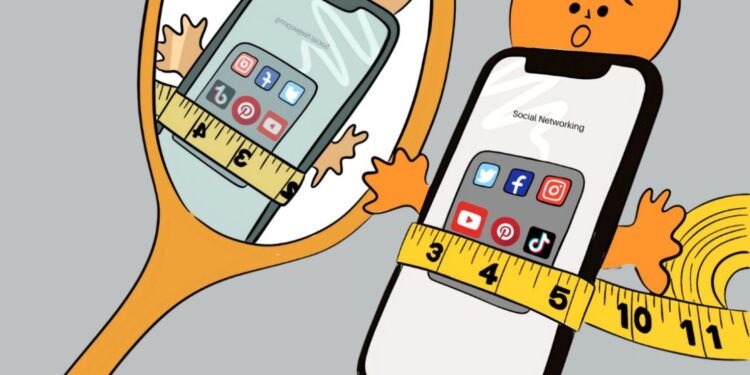Social Media is an integral part of our daily lives. It allows us to connect with others, digest news, share experiences and access a wealth of information. But, as social media platforms continue to dominate our digital landscape, there has been growing concern about their impact on body image and self-perception.
Findings of peer-reviewed research studies that have delved into the effects of social media on body image shed light on the extent of its influence and the resulting psychological consequences. Studies have shown a correlation between increased social media use and heightened body dissatisfaction, leading to psychological issues such as depression, anxiety, and disordered eating behaviours.
Even though most people understand that the images and lifestyles portrayed on social media often use filters, editing tools, and strategic poses to create an illusion of flawlessness. Why is it that people are still negatively affected by social media? Here are some factors that can help explain why people struggle to overcome negative feelings associated with social media.
Social Comparison: Even though we intellectually understand that social media does not reflect reality accurately, our emotional responses are influenced by the perceived gaps between ourselves and others. Social comparison is a natural human tendency, and social media provides an amplified platform for it. When we see others showcasing their seemingly perfect lives, bodies, or achievements, we often compare ourselves unfavourably.
Confirmation Bias: Humans tend to seek information that confirms their existing beliefs or insecurities. When we have doubts or insecurities about our bodies or self-worth, social media can act as a confirmation bias, reinforcing negative self-perceptions. We may unconsciously seek content that aligns with our insecurities, further exacerbating negative emotions.
Idealised Standards: Social media platforms often perpetuate and prioritise idealised beauty standards, success, and happiness. These standards can be unrealistic and unattainable and contribute to feelings of inadequacy. Constant exposure to such images can lead to internalising these standards and negatively impacting our self-esteem and body image, even if we intellectually understand the artificial nature of social media.
Steps to Reduce Social Media-Induced Insecurities:
1. Mindful Consumption: Be mindful of your social media content. Consider following accounts that promote body positivity, self-acceptance, and diverse representations of beauty. Surrounding yourself with positive influences can counterbalance the negative effects of unrealistic portrayals.
2. Curate Your Feed: Take control of your social media experience by curating your feed. Unfollow accounts that consistently promote unrealistic body standards or make you feel inadequate. Instead, follow accounts that align with your interests, hobbies, and personal growth.
3. Limit Screen Time: Set boundaries for your social media usage. Allocate specific times of the day for checking your feeds and avoid mindlessly scrolling for hours. Use screen time management tools available on most devices to help you stay accountable and reduce overall exposure.
4. Embrace Authenticity: Remember that social media showcases a highly curated version of other peoples’ lives. Embrace your uniqueness and understand that true beauty lies in authenticity and self-acceptance. Focus on your personal growth, achievements, and qualities that extend beyond physical appearance.
5. Seek Support: If social media-induced insecurities persist and significantly impact your well-being, consider seeking support from trusted friends, family, or professionals. Psychologists or support groups specialising in body image issues can provide guidance and help develop strategies for self-acceptance.
Social media’s impact on body image cannot be overlooked, but we can navigate this digital landscape more positively with conscious effort. By being mindful of our social media consumption, curating our feed, setting limits, embracing authenticity, and seeking support when needed, we can mitigate the negative effects and foster a healthier relationship with social media. Remember, your worth extends far beyond the pixels on a screen, and true beauty lies in self-acceptance and embracing your unique qualities.
By Phillipa Brown
Psychologist & Founder of MeHelp Psychology











